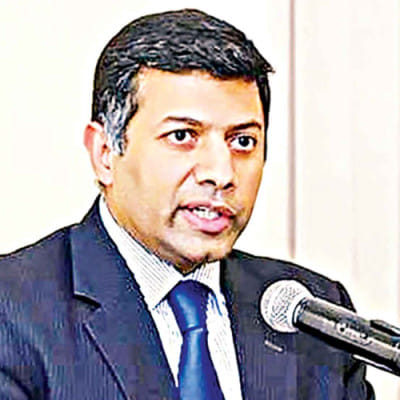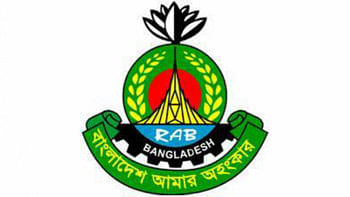Prosperous Bangladesh is in India’s interest

Any perception that India is not interested in Bangladesh's development should be dismissed as a conspiracy theory, Indian High Commissioner to Bangladesh Vikram Doraiswami said yesterday.
"Sometimes there is a sense that there is a lot of mistrust about our [Indo-Bangla] relations. Let me say categorically that a strong, stable, prosperous, flourishing Bangladesh is in India's fundamental national interest. Your success is the best thing that can happen to us," he said.
"Therefore, all the ideas that we are somehow not interested in Bangladesh's development, you can please dismiss them as conspiracy theories," Doraiswami said at a DCAB (Diplomatic Correspondents Association of Bangladesh) talk at the capital's Jatiya Press Club.
He said India itself has enough problems because it is a large country and a developing nation requiring economic development and stability.
He also dismissed the perceptions that Bangladesh-China friendly relations were affecting Bangladesh-India friendship, and that India shows a "big-brotherly" attitude towards Bangladesh.
"In modern age, there is no basis for some of these concerns … I would not like to spend my time speculating your relations with others, because my concern is your relationship with me," Doraiswami said.
He said the approach to the friendship should be based on the fact that Bangladesh and India are so much better off working together than otherwise.
Doraiswami said as Bangladesh celebrates its 50 years of independence, the bilateral relations will be consolidated further and more focus will be given on a shared future.
The expected visit of Indian Prime Minister Narendra Modi to Dhaka on March 26 will focus on that issue, he said.
Indian External Affairs Minister S Jaishankar is expected to visit Dhaka on March 4 prior to Modi's visit.
"We need to remember and carry forward the understanding that our relations are based on history. 1971 is the foundation stone of our relationship. It also means that we share so much more than what could divide us," the Indian high commissioner said.
Bangladesh is special as a friend and relations with Bangladesh is the cornerstone of India's foreign policy, he said.
Replying to a query on inauguration of projects during the Indian PM's visit, Doraiswami said the two countries were finalising a number of projects, including on energy cooperation, people-to-people relations, political relations, etc. The Bangabandhu-Bapu Digital Museum, which was inaugurated in Delhi, will also be brought to Dhaka. A major component of the visit will be the celebration of the 50 years of independence, he said.
Asked what was obstructing the holding of trial of the Pakistani Army for committing genocide in 1971, the Indian high commissioner said, "To the best of my knowledge, there is no statute of limitations on genocide. The genocide convention makes it very clear that there is no statute of limitations in terms of time, and there is no statute of limitations on any kind of arrangement that may have been arrived at."
"So this [genocide trial] is something that is entirely within the prerogative of the Government of Bangladesh to assess history and to see how this goes forward," he said while sharing his "personal understanding" of the international law on this matter.
He also suggested that the 1974 agreement must be seen in the context of that time since it was done to ensure that Bangladeshis in Pakistan custody could return home.
"History is history and whatever was signed was signed at that particular time. It's the prerogative of the Bangladesh government to have its own perspective on the matter," he said.
"We would certainly watch it with sympathy and understanding," the high commissioner added.
WATER SHARING
Asked on the Teesta water sharing deal, Doraiswami said the Indian government is committed to it.
The deal could not be signed in 2011 due to opposition from West Bengal Chief Minister Mamata Benarjee.
"Our friends need to understand that this is not a matter on which our union government has a single say," he said, adding that this was a process that they had tried very hard to complete and would continue to do that because "we understand the importance of sharing water".
He said India had shared river water in the past and was prepared to share water not only of the Teesta but also of all other shared rivers as equitably as possible. He also noted that states within India have problems in terms of sharing water.
Doraiswami said Bangladesh and India had held joint technical level meetings on water sharing and both sides felt that the relevant data seemed to be on the same line. Once it was further harmonised, both the countries would be able to go for signing agreements on six rivers, he said.
"Essentially, we are very keen to show progress on as many rivers as it is possible."
BORDER KILLINGS
Nobody wants to see lives being lost on the border and certain things need to be cleared, Doraiswami said.
India's Border Security Force (BSF) is not targeting the people and that border killings happen within the Indian border from 11:00pm to 4:00am when it is not a normal time to cross the border. That means there are criminal activities going on and the BSF uses lethal weapons only to defend themselves, he said.
It is not the case that only Bangladeshis are killed or left injured on the border. Almost 50 percent of the casualties happen to Indians, he claimed. BSF constables are also injured.
He stressed on legal economic activities on the border sides and taking joint measures to prevent illegal activities on the border.
CONNECTIVITY PROJECTS
Doraiswami said a lot of the trade depended on infrastructure and connectivity projects in Bangladesh. Transporting Indian goods through Bangladesh, using the Chattogram port and the Akhaura-Agartala route, can begin after the Bangladesh government issues Statutory Regulatory Orders (SROs) and both the governments finalise the cost of transporting goods, he said.
"We want fair price. This will benefit both Bangladesh and India because Bangladeshi trucks, port handlers and insurance companies will benefit, while India can benefit from reduced time of transport and cost," he said.
On the operationalisation of Bangladesh, Bhutan, India and Nepal Motor Vehicle Agreement, he said India and Nepal already have a regulatory framework for plying of two countries' trucks and buses between the two countries. Now Bangladesh needs a regulation. India has already approached Bangladesh towards this end and is waiting for response, he said.
VACCINE COOPERATION
Doraiswami said India has offered Covid-19 vaccines to Bangladesh Armed Forces.
"We will be happy to provide vaccine to Bangladesh Armed Forces," he said.
India earlier supplied two million doses of Oxford-AstraZeneca vaccine to Bangladesh as a gift. Bangladesh is also buying 30 million vaccine doses from the Serum Institute of India through Beximco Pharmaceuticals. The first batch of five million doses has already arrived and the rest is in the pipeline.
DCAB President Pantho Rahman and General Secretary AKM Moinuddin also spoke at the programme yesterday.

 For all latest news, follow The Daily Star's Google News channel.
For all latest news, follow The Daily Star's Google News channel. 



Comments